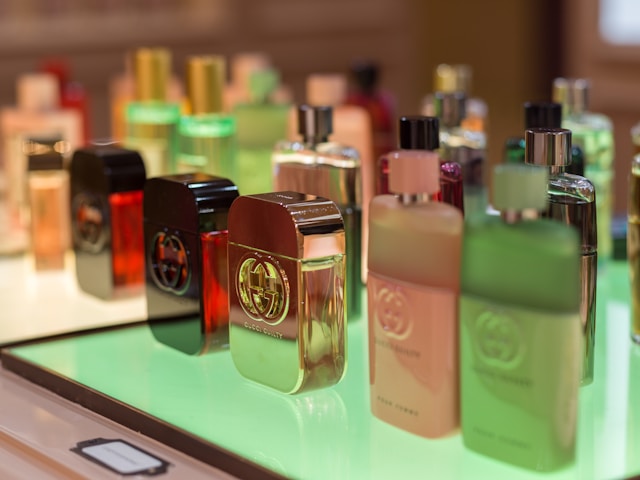5 Essential Features to Check in Your Perfume

Perfume is a unique way of showing who you are. It can be your invisible touch, adding character to who you are and how you look, and keeping individuals remembered. Numerous options make it highly confusing when it comes to choosing the right perfume. The knowledge of these essential elements to look into a fragrance could assist this confusion for simpler selection. Let us examine five important factors to take into consideration while selecting a scent. That way, you'll end up choosing one that fits your inclinations, lifestyle, and requirements.
Fragrance Notes: Understanding the Composition
Fragrance notes are essential when designing a fragrance because they affect how it smells over time. Base notes, heart notes, and top notes, these three layers make up a perfume. These notes work together to produce a complex and captivating scent.
- Top Notes: The initial impressions every time you smell the perfume come under Top Notes. Usually, they are bright and colorful, new, and accessible to view to immediately catch attention. Before disappearing, these smells last about 15 to 30 minutes. The main notes contain a range of fruity scents, including grapefruit, lemon, and bergamot, as well as delicate floral scents, including lavender and neroli.
- Heart notes: The primary smells that emerge following the initial phase of odors becoming air are known as heart notes. These notes typically endure several hours and are distinguished by softer, more comprehensive fragrances. The heart notes are defined by the floral notes of roses, jasmine, and ylang-ylang, together with the spicy fragrances of cinnamon and cardamom.
- Base Notes: The base notes are the basic odor of the perfume that remains throughout, in some way or another. The stronger, pleasant smells that include wood, musk, amber, or vanilla help this fragrance feel warm and rich, making it memorable.
Sillage: The Perfumes Trail
The smell that stays in the air after you have passed, the other vital factor to consider is sillage. While others have a stronger scent that will still be noticed from farther away, some fragrances are soft scents and will only stay close to your body.
- Light Sillage: Those perfumes that don't leave a powerful trail of fragrant smell, then they are gentle and perfect for situations where you want your smell to stay low-key, for example, at work or during close conversations. Such smells are usually soft flowery, fresh citrus fruits, or watery smells.
- Heavy Sillage: Fragrances with a very strong scent trail are more visible and influence individuals' lives. They usually contain very active ingredients, such as patchouli, amber, or musk. These types of ingredients can work very well in spreading out their smell and staying in the air for a long time.
Sillage varies depending on the weather or location. Warm conditions increase the spread of your perfume, thus making your smell stronger and lasting for a period. It barely spreads and even goes unnoticed in cool temperatures. Whether it is spending time at the office or a fun night out, knowing how your perfume works in various settings will assist you pick the right one for the occasion.
Perfume Concentration: Strength and Intensity
How much perfume oils are added to a fragrance has a big impact on how strong and durable the scent is. It was already established, that the strength of fragrances varies, and the intensity and longevity of the aroma that is wanted determines which fragrance to choose.
- Perfume (Extrait de Parfum): This kind of perfume, which has 20–30% fragrance oil, is one of the strongest kinds on the market. Perfume has a very strong smell that lasts for up to 24 hours on your skin, this is one of the type kinds of perfumes. For special occasions, perfume usually comes at a greater cost because it is stronger and lasts longer which makes it very unique.
- Eau de Parfum (EDP): Made up of 15% to 20% fragrance oil, its power is stronger but remains useful. EDP is usually chosen because it provides good strength. It offers a long-lasting scent that is not too strong.
- Eau de Toilette (EDT): With a fragrance intensity of 5–15% and a longevity of 4-6 hours, Eau de Toilette provides a softer option for people who want a less powerful perfume.
- Eau de Cologne (EDC): For Eau de Cologne (EDC), 2-4% of perfume oil is the perfect amount. Hence, it is light and refreshing. It's great for a quick pick-me-up but doesn't last long if worn. It can commonly be seen in body sprays or after-shave products.
Knowing how intense a fragrance is will also enable you to pick the right fragrance for the right occasion. By the evening or even on special occasions, you could be among those who want something not too strong during morning hours and stronger.
Skin Chemistry: How It Interacts With Your Body
No part of any perfume is as soft-overlooked as how it mixes with your skin however vital it remains as a compliment. Every person's skin is various. The differences in oiliness, pH levels, and even body temperature can make a significant difference in how it smells and lasts. That is why it may smell good on you, but bad on someone else.
- Skin Type: The smell is held by oil in your skin because perfumes tend to stay longer on oily skin. Dry skin makes perfumes fade away much faster. Your perfume will remain longer if you moisturize your skin before applying it.
- PH Levels: The pH level of your skin determines what the fragrance will smell after some time. Making it more or less nice, is decided by a fraction change that can make the perfume.
- Body Temperature: Scents smell stronger on warm skin because heat helps the perfume spread more. Applying perfume to sensitive areas such as the neck, wrists, or behind the ears can intensify and extend its scent.
It’s important to try a perfume on your skin before buying it. A perfume in the bottle might smell different on your skin, changing from a scent you love to one you didn’t expect. To see how the scent affects your skin, allow it to grow over a few hours.
Bottle Design and Packaging: Aesthetics and Practicality
The smell is the main thing that matters, but the bottle's look and packaging can also affect your choice. The looks of perfume bottles are often created to match the fragrance of the perfume within. However, we should also think about how useful the bottle's design is, not just how it looks.
- Spray Mechanism: A good spray system creates a smooth, light mist, making it easy to apply evenly and control how much comes out. A steady spray helps you use the right amount of perfume and stops you from wasting it. Bad nozzles can make too much perfume come out or spread unevenly, ruining how you enjoy your perfume.
- Portability: If you enjoy traveling or want to use perfume again during the day, a small and easy-to-carry bottle is important. Small, strong packaging can help when you are taking your fragrance with you.
- Durability: How long a fragrance lasts is very important, especially for costly ones. A strong bottle made from good materials keeps your perfume safe from breaking and lasts a long time.
Conclusion
When choosing a perfume, you should think about more than just how it smells in the bottle. By knowing important things like the smell, how long it lasts, how far the scent spreads, how strong it is, and how it works with your skin, you can choose a perfume better. Perfume is a very personal item, and choosing the right one can improve your style, bring back memories, and make a strong impression on others. By keeping these five important features in mind, you will be more prepared to pick a perfume that fits your style, likes, and everyday activities.








